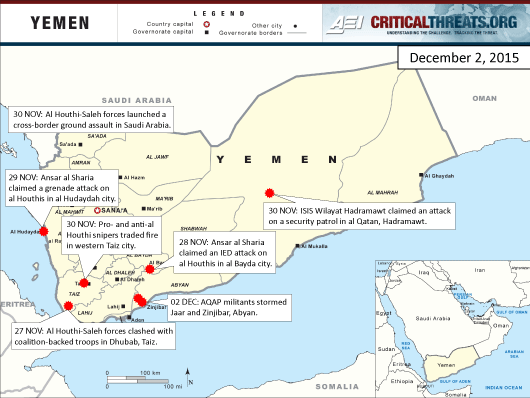Pro-al Houthi forces launched their first large-scale ground assault on the Saudi-Yemeni border, signaling an inflection that may incite Saudi retaliation and possibly alter the Saudi-led coalition’s ongoing shift from combat operations to stabilization operations.
A large al Houthi-Saleh force launched cross-border attacks on Saudi military sites, marking an uptick in hostilities near the Saudi-Yemeni border. Hundreds of al Houthi-Saleh ground troops attacked Saudi watchtowers on November 30 and December 1, according to reports. Saudi Arabia’s official news agency reported an attack on two watchtowers in Jazan province in southwestern Saudi Arabia, while pro-al Houthi media claimed that al Houthis destroyed several Saudi assault vehicles and tanks in neighboring Najran province. Al Houthi-Saleh forces have shelled Saudi territory, clashed with Saudi border patrols, and claimed multiple raids on Saudi military sites during the past eight months. However, this ground assault is the first large-scale cross-border attack confirmed by Saudi military sources. Saudi-led coalition spokesman Brig. Gen. Ahmed Asiri suggested the border attack was in retaliation for a coalition airstrike that hit an al Houthi headquarters in Sa’ada governorate on November 29, which may have killed the brother of al Houthi leader Abdul Malik al Houthi. The Saudi response to the recent attack will probably be continued airstrikes against al Houthi targets. Saudi ground troops are unlikely to pursue al Houthi forces into their mountainous home territory in Sa’ada governorate.
The battle for Taiz governorate remains deadlocked. Taiz is critical terrain for both sides because of its geostrategic position and historical importance. Coalition-backed forces failed to achieve significant territorial gains in al Misrakh and al Rahidah, to the south and west of Taiz city, respectively, despite a surge in support to local fighters there two weeks ago. Clashes also continued in the Dhubab region of southwestern Taiz near the Bab al Mandeb strait, where coalition-backed forces are attempting to retain control against an al Houthi-Saleh counterattack. The al Houthis retain control over access points to Taiz city and are accused of obstructing the delivery of humanitarian aid to approximately 200,000 civilians. Neither side is likely to gain significant advantage, and the ongoing fighting will continue to exacerbate the humanitarian crisis.
The UAE is supplementing Emirati combat troops with Latin American and Eritrean forces that will likely serve as a protection force in Aden. The UAE deployed 450 Latin American troops, predominately Colombian mercenaries, to Yemen last month, adding to 400 Eritrean soldiers already embedded with Emirati troops. Additional Colombian troops are completing training with grenade launchers and armored vehicles in the UAE to prepare for deployment. Emirati troops, including special forces, will likely continue to shift toward stabilization and counterterrorism operations, supplemented by foreign troops with low-skill guarding and patrolling missions. Emirati objectives for the coalition appear to be the re-establishment of the Hadi-led government in Aden in order to set conditions for a negotiated settlement.
Tensions within President Abdu Rabbu Mansour Hadi’s government are undermining the UN-led peace process. Yemeni Vice President Khaled Bahah rejected a cabinet reshuffle ordered by President Hadi as “illegitimate” on December 1, indicating that the relationship between the two leaders continues to deteriorate. Anonymous diplomats alleged that President Hadi is obstructing peace talks out of fear that a politically negotiated settlement will remove him from office, especially if that settlement occurs before Hadi’s Saudi-led coalition backers secure a decisive victory on the ground. Vice President Bahah enjoys more popular support than President Hadi. President Hadi’s recent efforts after his return to Aden, such as the appointment of government and security officials in Hadramawt governorate, signal an attempt to solidify his influence and marginalize Bahah.
Islamic State in Iraq and al Sham (ISIS) affiliates are continuing to expand throughout Yemen. ISIS Wilayat Sana’a, based in central Yemen, and ISIS Wilayat Lahij and ISIS Wilayat Aden-Abyan, based in southern Yemen, claimed credit for the execution of three al Houthi and Popular Committee fighters between November 29 and December 1. ISIS Wilayat Hadramawt also claimed responsibility for an attack on a Yemeni military patrol in al Qatan, Hadramawt in eastern Yemen on November 28. ISIS affiliates will continue to exploit the security vacuum to conduct operations against both pro- and anti-al Houthi forces throughout the country. (Sources available upon request)
Al Qaeda in the Arabian Peninsula (AQAP) is gaining strength in southern and central Yemen. AQAP militants stormed Zinjibar and Jaar in Abyan governorate on December 2, exploiting the absence of government administration and security to occupy the two towns for the second time since 2011. The two southern Yemeni towns are about 30 miles from Aden, where Saudi-led coalition forces are attempting to provide security and reestablish Hadi’s government. Ansar al Sharia, AQAP’s insurgent arm, conducted nearly a dozen improvised explosive device (IED) and direct-fire attacks on al Houthi-Saleh forces in al Bayda governorate, central Yemen between November 18 and November 30. AQAP militants will continue to strengthen relationships with tribal militias by spearheading the anti-al Houthi fight in al Bayda. Ansar al Sharia also claimed credit for a November 29 grenade attack on an al Houthi gathering in al Houthi-controlled al Hudaydah city on Yemen’s Red Sea coast. (Sources available upon request)
Saudi retaliation for cross-border attacks may drive tension within the coalition and ultimately prolong the conflict. AQAP expansion in southern Yemen threatens coalition efforts to secure Aden and build support for the internationally recognized government.
James Towey and Joshua Koontz contributed research for this piece.

